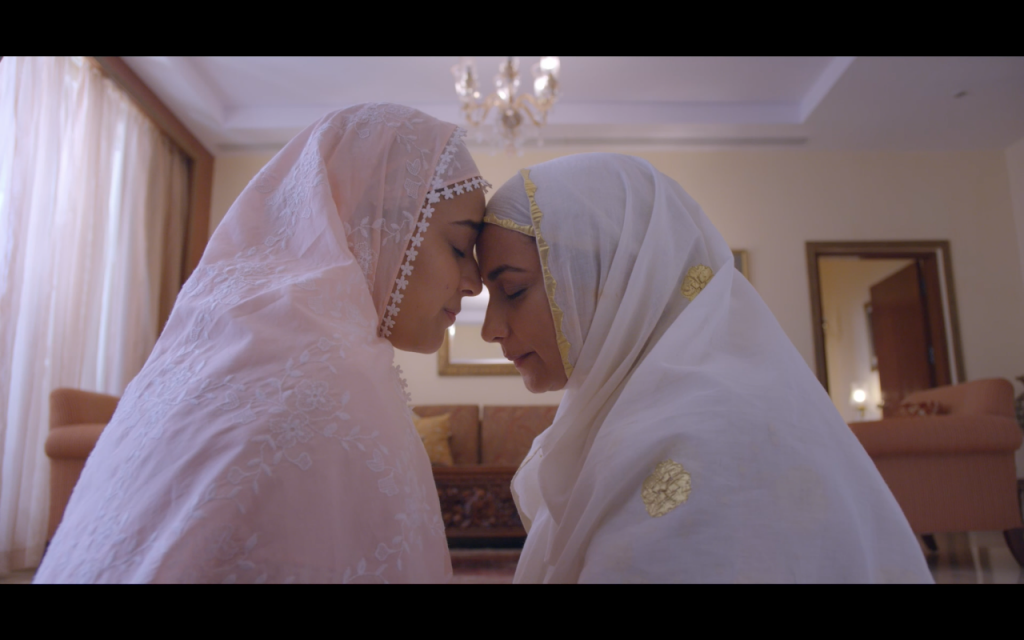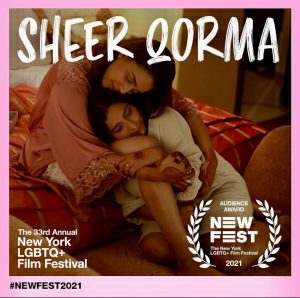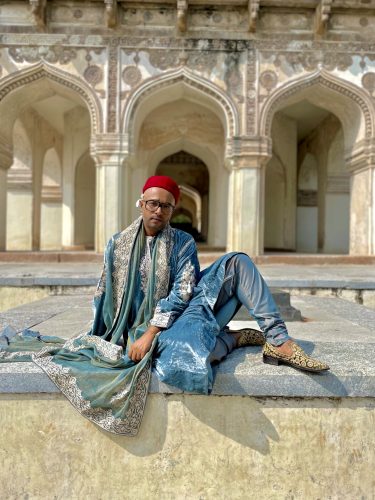Hyderabad Queer Film Festival was revived on Dec 12th, 2021 making it the 4th instalment of the festival after 2012, 2014 and 2017. The festival director, Moses Tulasi, a technologist turned filmmaker and writer on Hyderabad history and culture, sat down with Faraz Arif Ansari whose film “Sheer Qorma” had its first public screening in India at the festival, for an interview for Saranga.
HQFF was organised in collaboration of several Hyderabad based queer activist CBOs and NGOs. The festival has a history of standing up to threats from right wing political parties and individuals and celebrating queer themed cinema.
Faraz Arif Ansari identifies as a Muslim, gay & non-binary independent, queer filmmaker. Faraz hopes to mainstream queer stories that seldom find a place in mainstream cinema and media, especially stories about queer people of colour, by celebrating them.
Thank you Faraz bhai for bringing Sheer Qorma and Sisak to HQFF 2021. We can’t express how elated we are at HQFF to screen these two very special films. Let me start with asking you about the conception stories of both the films?
Both, Sisak and Sheer Qorma were born out of a dire need for honest, authentic queer representation that is mostly missing in South Asian cinema. The ideas stemmed from all the misrepresentation that one has grown up watching in films. As a storyteller, I wanted to change the narrative by bringing it closer to real queer identities told by queer people and not the cis-het folks who keep misrepresenting us. So really, it boils down to two things: lack of authentic representation and misrepresentation.
Among the many layers of Sheer Qorma, what I personally enjoyed were the socio cultural and political layers. You have chosen to use urdu or rather Hindustani as the medium. Can you shed some light on this?
Just as clothes and fragrances don’t have a gender, language does not have a religion. Sadly, in the world we live in, it is considered otherwise, be it for clothes, fragrances or even language. I feel the onus is on artists and storytellers to keep pushing the narrative for a broader sense of understanding and also, to make the audiences question preconceived prejudices that have been inculcated within us all. Just like all Muslims don’t live in homes with green coloured walls, or eat kebabs and biryani everyday, or wear skullcaps and burqas, or even speak chase Urdu — these are stereotypes that have been pushed through times. When it comes to representation, I wanted to see my family being represented in cinema — a version of Indian Muslims that are often amiss from the bigger narratives, as if we don’t exist, for our identities do not fit into the tailormade stereotypes. Sheer Qorma brings forward that, through it’s socio-cultural spectrum along with the politics that it stands for, be it queer, having a gender identity that a lot of folks haven’t heard of, or being a minority in India. Sheer Qorma challenges all of that, through a sublime narrative that ebbs at the audiences to think beyond the binaries. Urdu, on the same hand, has been a dying language in India for it has been coloured as a language of the Muslims — who are, in the current political scenario, looked upon as barbaric invaders. I am often called, “Saale Mughal ki aaulad!”, “Aurangzeb ki aaluad!”, etc. During the release of Sanjay Leela Bhansali’s Padmavat, it had become “Khilji ki aaluad!” and often at times, because of the language that we speak — Hindustani, not Urdu, not Hindi. When Sheer Qorma’s trailer dropped, someone on social media commented, “Why is Shabana Azmi’s character wearing a saree? Isn’t she a Muslim?” — that’s the mindset one is trying to tell stories to. Stories about inclusion, love and acceptance that will hopefully, make us more embracing of each other, no matter who we are. It’s a long, long way but every step matters. Sheer Qorma is a step forward in that direction.
Also, queerness is often dealt in films and media in isolation of social factors like class, caste and religion in South Asian context or even Western for that matter. However Sheer Qorma turns this on it’s head. Was this a conscious decision or something that organically happened?
There are no coincidences in cinema, or life, for that matter. Everything happens for a reason. Sheer Qorma is born at an intersectionality that one often runs away from — to bring sexuality, gender identity and one’s faith in the same spectrum. Being an openly queer, non-binary, Muslim individual, living in India — I feel that visibility is of paramount importance to me. There is a constant shoving away of different identities and minorities, even in the LGBTQIA community in India that for it’s majority, is deeply Islamophobic, transphobic and femmephobic. I deal with this on a regular basis and hence, when I decided to make Sheer Qorma, I wanted to open a larger dialogue about inclusion and visibility and also, talk about the underlying prejudices that stem from embracing intersectionalities.
You know how special the film is for us Hyderabadis given Shabana Azmi’s connection to Hyderabad from the maternal side and also her incredible contribution to Hyderabadi Dakhni films from the parallel cinema movement like Ankur(1974) and Mandi(1983). How do you feel about screening your film in Hyderabad and what are the feelers from Shabana ji?
There was always a lot of excitement about the Hyderabad screening for it happens to be our first public screening in India but of course, what made it even more special is Shabana ji’s bond with Hyderabad. We, as a team, were so excited because a large part of Shabana ji’s family and friends were also in attendance for the screenings. That really made it very, very special. Shabana ji personally reached out to all her family and friends in Hyderabad to invite them. That’s how invested she is, not just as an actor, but also as a strong ally.
Sisak is a milestone for Indian cinema in that it’s a silent film and thats what makes it even more spectacular. How did this idea come out to be and what was the reaction from the audiences worldwide?
Sisak was conceived and filmed pre 377 verdict of September 2018, when homosexuality was a punishable crime in India. It was interesting because when I sat down to write Sisak, I had so much to say, but ended up using no words at all, for that is how I felt — we didn’t have a voice. And in that helplessness, I found silence — perhaps, way stronger than any words, to convey the plight of the Indian queer community, that struggles to find a place and a voice for itself, a place to exist, a place to love, a place to be. Sisak ended up becoming the first ever Indian film to win 60 International Awards at some of the biggest film festivals in the world. Interestingly, it never won any award back in India.
You have received multiple threats from right wing groups on Sheer Qorma. How do you deal with such pressure and anxiety around this?
With love. That is the only way. There is so much hate for they know no better. My journey as an artist, as a filmmaker, is to bring everyone under the same roof, in front of the same screen, and speak to them through my cinema to open dialogues with them. If we don’t invite them to our table, we will never be able to heal each-other. It is okay if they throw the chair and walk away later. But it is imperative to try. The power is in the attempt.
Last but not the least, how was your Hyderabad experience? What all did you get to do here?
Hyderabad was all heart! From the scrumptious food to the overwhelming response at the screening of Sheer Qorma, where over 300 people showed up, it was all so very heartwarming. I think what mades the Hyderabadi food so special is the people, their hospitality and the air of tehzeeb that the city has. I felt it deeply everywhere I went, and I cannot wait to come back and experience it all over again!









Add comment